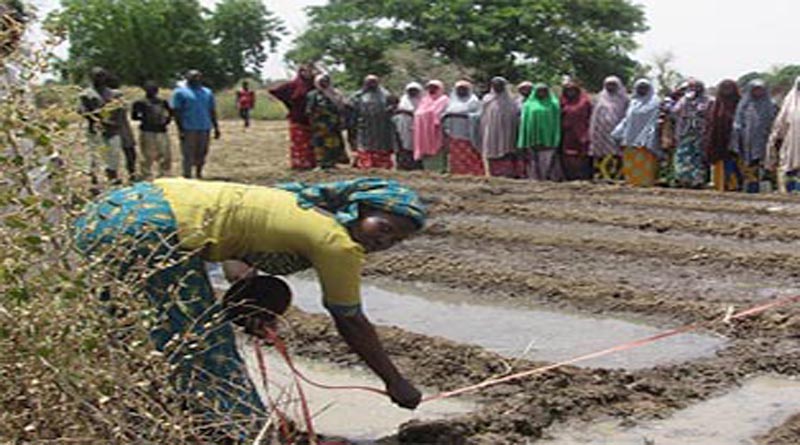TechnoServe: Improving rice and tomato farmers’ livelihood in Nigeria
TechnoServe is an international nonprofit that promotes business solutions to poverty across 29 countries of the developing world including Africa by linking people to information, capital and markets

TechnoServe’s mission is working with enterprising men and women in the developing world to build competitive farms, businesses, and industries.
The nonprofit is working in about 20 African countries including Tanzania, Zambia, South Africa, Benin, Ghana and Nigeria, where they are currently implementing the ‘Promoting Rice and Tomato Farmers Livelihood in Nigeria’ program with the support of ExxonMobil, the world’s largest publicly traded international oil and gas company, and Syngenta, the global agribusiness company producing agrochemicals and seeds.
The project which is being implemented in the northern states of Katsina, Jigawa, Kano and Plateau is providing smallholder farmers of rice and tomato access to quality inputs and modern farming technologies including zero energy cooling chambers for tomato preservation, row transplanting of rice as well as effective fertilizer application processes, amongst others.
“We are helping to increase smallholder farmers’ economic conditions through training, access to finance, quality inputs, produce aggregation as well as linking them up with buyers who offer them premium,” says Olorunfemi Oloruntoyin, the project manager of the Promoting Rice and Tomato Farmers Livelihood in Nigeria programme, while speaking at a recent rice brown field day at Danbare community of Warawa Local Government Area (LGA) of Kano state.
Oloruntoyin said TechnoServe’s drive was aimed at improving smallholder rice and tomato farmers’ livelihoods through cutting-edge interventions tailored towards endangering sustainable empowerment and financial independence for farming households adding that they were working with microfinance institutions to help farmers develop saving culture and extend access to finance for farmers in rural areas.
“TechnoServe has brought us many farming technologies,” says Kabiru Yahaya, one of the smallholder farmers being supported by TechnoServe in Warawa. “Farming begins with quality seed, we were given quality seed. They are also linking us up with agric processing companies that will buy our produce at reasonable prices.”
Yahaya’s farm was used as one of TechnoServe’s demonstration farms in Warawa thus his rice field was divided into 2 equal sizes, he was asked to adopt his traditional farming practice in one half of the field while TechnoServe’s model of cultivation is practiced in the other half – to make him clearly understand the difference between the 2 farming methods.
“I got 3.5 bags of rice on my half of the field and they got 8.5 bags of rice on the other half, using TechnoServe’s technology, which is almost three times what I got,” says Yahaya.
One of the unique features of the programme is that it ensures equal (50:50) opportunities for both men and women, in a region where women’s participation across the agricultural value-chain is not anything to write home about. Kaltume Sarina, a rice farmer, is one of such women beneficiaries of the program’s intervention in Garko LGA of Kano state who says she had been empowered to produce much more rice than she usually does.
“I was getting around 8 bags of rice after harvesting my rice field, using our traditional methods of farming but this year, having adopted TechnoServe’s model of farming, I am looking forward to harvesting like 13 to 14 bags of rice,” says Maryam Muhammad, a divorcee farmer from Kaugama LGA of Jigawa State. She uses proceeds from her farm to pay for the school fees of her 6 children including two that are currently studying in tertiary institution.
Aminu Kawu is a TechnoServe agric extention worker in Jigawa State who has been working with 100 farmers (50 men; 50 women) at Kirikasamma LGA of the state. In accordance to TechnoServe’s model, Kawu made the smallholder farmers in his group to divide their farm plots into two equal sizes each and practice their traditional methods on one half while TechnoServe’s modern techniques is adopted on the second half: the outputs are remarkably different!
“TechnoServe is changing smallholder farmers’ orientation from viewing farming as a way of life to viewing it as a profitmaking venture. Now, our farmers are harvesting up to 13 bags of rice in a farm plot of the size of 1050 square meter; against 7 bags on the same size of farmland using traditional methods of farming,” says Yahaya Buba, director in charge of agricultural extension services at the Jigawa State Agricultural and Rural Development Authority (JARDA) at a similar field day held in Malam Madori LGA of Jigawa State.
Buba said TechnoServe was also linking up Jigawa farmers with seed, agrochemicals, and fertilizer companies to ensure they have access to quality inputs while the state government was enlightening the farmers on the need to adopt modern technologies of farming as well as repay agric loans, saying only between 20% and 30% of farmers in the state pay back loans given to them by either the government or private companies.
Moreover, access to finance has been identified to be one of the key hindrances to smallholder farmers’ quest to access quality farm inputs towards as they aspire to adopt modern technologies of farming in northern Nigeria.
“Farmers still find it difficult to access the technologies being introduced to them due to lack of access to finance. We have therefore been reaching out to financial institutions and are making some headway. We are also looking at how to engage the farmers directly,” says Hamza Mahuta, Syngenta’s representative in Nigeria.
Ademola Festus is the Nigeria country manager of Kickstart International, a social enterprise that designs and mass-market manually-powered irrigation pumps for smallholder farmers in Africa who says TechnoServe is looking at acquiring about 3,000 of Kickstart’s manually-powered irrigation pumps for smallholder farmers in northern Nigeria.
Kickstart is a key partner of TechoServe’s in its quest to ensure smallholder farmers have access to quality and affordable inputs.
“TechnoServe is looking at buying about 3,000 pieces of our pumps for farmers in Nigeria; the simple technology pump is diesel-free and requires little physical energy to operate such that even a 7 year old can operate the pump. As an organization, our concern is the impact of our innovations on the lives of smallholder farmers in terms of ending poverty,” says Festus.













